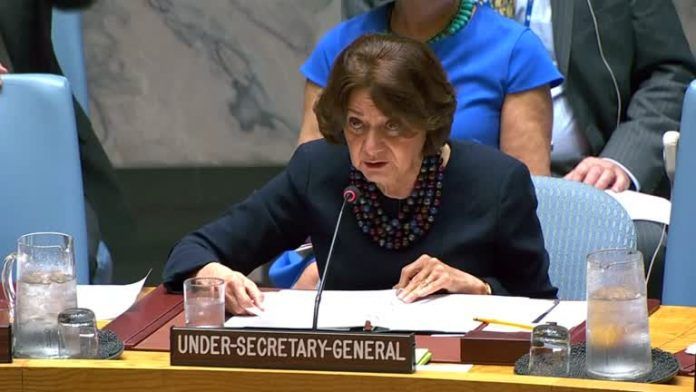By Michelle Nichols
UNITED NATIONS, June 26 (Reuters) – Iran warned the U.N. Security Council on Wednesday that it would no longer be burdened with preserving a 2015 nuclear deal with world powers as European states pushed Tehran to stick with the agreement because there is “no credible, peaceful alternative.”
U.S. President Donald Trump withdrew from the deal last year, inflaming tensions between Tehran and Washington that led to Iran shooting down a U.S. drone last week. Trump ordered retaliatory air strikes but called them off at the last minute.
Under the deal to curb Tehran’s nuclear program most U.N. and western sanctions on Iran were lifted, however the United States has imposed new sanctions that it says are designed to force Iran back to the negotiating table.
“The U.S. withdrawal from the JCPOA and re-imposition of its sanctions, rendered the JCPOA almost fully ineffective,” Iran‘s U.N. Ambassador Majid Takht Ravanchi told the 15-member Security Council, using the acronym for the deal’s formal name, the Joint Comprehensive Plan of Action.
“Iran alone cannot, shall not and will not take all of the burdens any more to preserve the JCPOA,” he said.
European powers have been trying to save the deal, but Iran has has given them a deadline of July 8. It has said it is ready to go through with a threat to enrich uranium to a higher level than permitted under the deal if Europe cannot shield Tehran from U.S. sanctions.

“The JCPOA is a nuclear agreement that has been working and delivering on its goals. There is also no credible, peaceful alternative,” European Union U.N. Ambassador Joao Vale de Almeida warned the U.N. Security Council.
The nuclear deal is endorsed in a 2015 Security Council resolution. U.N. Secretary-General Antonio Guterres reports every six months on the implementation of that resolution, which also subjects Iran to an arms embargo and other restrictions.
MIXED SIGNALS
Acting U.S. Ambassador to the United Nations Jonathan Cohen described Iran‘s actions as “deeply counterproductive.”
“Iran‘s defiance of the Security Council and its reckless behaviour threatening peace and security globally must not be downplayed in the name of preserving a deal that doesn’t fully cut off Iran‘s path to a nuclear weapon,” he said.
He noted that the U.N. resolution endorsing the nuclear deal “provides a mechanism for the council to address significant non-performance of Iran by its nuclear commitments.”
Under the nuclear deal there is a process culminating at the U.N. Security Council that can trigger a so-called snapback of all sanctions if Iran violates the agreement.
Iran‘s U.N. Ambassador Majid Takht Ravanchi told reporters on Monday: “The U.S. is not in a position to spark snapback because they are not part of the deal.”
French U.N. Ambassador Francois Delattre warned that the end of the deal “would mean a dangerous step backwards” and urged Tehran not to breach the deal.
Russian U.N. Ambassador Vassily Nebenzia said Moscow wanted Iran to remain committed to the nuclear deal, but also accused the United States of sending mixed signals.
“We hear assertions that nobody is planning regime change in Iran and then at the same time we hear threats about obliteration and new sanctions are being introduced, there are calls for dialogue and then in parallel openly they declare the intention to increase military presence in the region,” he said.
“Such signals, which even an experienced cryptologist would struggle to decode, can only bring the situation to a point of no return,” Nebenzia said.
(Reporting by Michelle Nichols Editing by Nick Zieminski and James Dalgleish)


